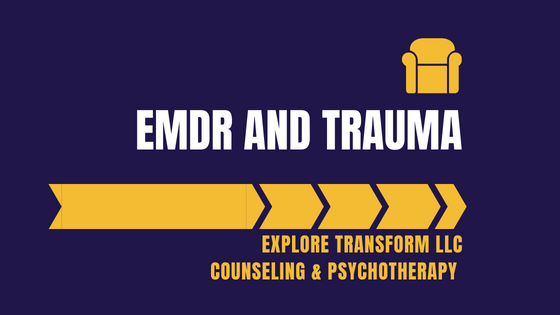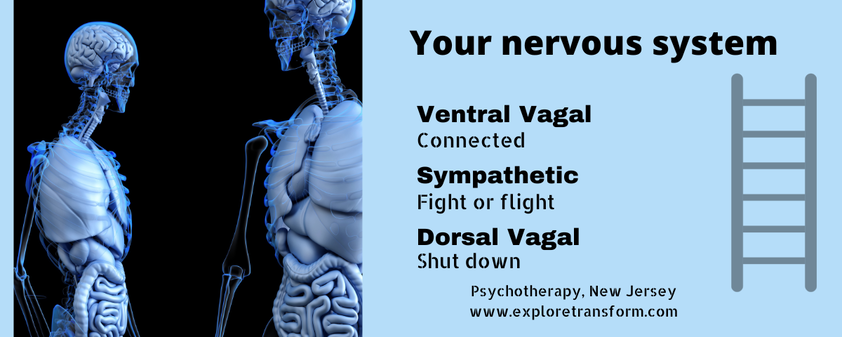Are you experiencing any of the following symptoms?
- You feel too much. For example -
- You feel stressed, anxious, or burned out
- You are easily startled, nervous, or jumpy
- You feel too little. For example -
- You feel detached, heavy, or lethargic
- You feel numb or disconnected from the world around you
- Your thoughts are stuck in certain patterns. For example -
- 'I am unsafe'
- 'Something is wrong with me'
- 'I am powerless
- 'I cannot trust others'
- 'It is always my fault'
- Your relationships are negatively impacted. For example -
- You find it hard to trust people
- You cannot seem to connect to friends and family
- You have been experiencing relationship conflict
What is EMDR Therapy?
Eye Movement Desensitization and Reprocessing (EMDR) is a type of therapy that helps your brain's natural healing process. Disturbing memories can get stuck in the brain, and even if this relates to incidents from years ago, we can remain trapped with the same unhelpful beliefs, emotions, or bodily sensations.
The purpose of EMDR is to bring you to a point where you can sit with these experiences so that you are no longer distressed by them.
By the end of the reprocessing, you will feel, think, and believe in your body, that the once-distressing experiences are in the past, and not in your present.
Unlike other approaches -
The purpose of EMDR is to bring you to a point where you can sit with these experiences so that you are no longer distressed by them.
By the end of the reprocessing, you will feel, think, and believe in your body, that the once-distressing experiences are in the past, and not in your present.
Unlike other approaches -
- EMDR does not involve exposure, and so you do not need to relive traumatic memories in any great deal
- EMDR is not a relaxation exercise
- EMDR is not an attempt to overpower your negative experience with cognitive challenges (altering the way you think
Polyvagal Theory and EMDR
Many EMDR therapists use polyvagal theory to help someone understand that their body and mind are responding in a certain way because it is biologically built to do this. Your nervous system is responding to cues of danger or safety, and so symptoms of anxiety, depression, and trauma responses, are easier to understand when we view our nervous system as a ladder (as shown in the diagram below).
At the bottom of the nervous system ladder, in response to cues of danger, our nervous system can shut down. Here we can feel numb, blank-minded, even depressed. Think of how we might be caught by the saber-tooth tiger; our nervous system cleverly shuts us down so we do not feel the pain of the bite of the tiger. This is the work of the part of the parasympathetic nervous system that is known as the dorsal vagal response.
In the middle of the nervous system ladder, in response to cues of danger that we have a hope of escaping, our nervous system will respond by increasing our heart rate so we can fight or flee the danger. Here we can find outbursts of anger and anxiety, and this is the work of the sympathetic nervous system.
Finally, at the top of the nervous system ladder, we find the most evolved response, in response to cues of safety, when we can connect with ourselves and others. Thanks to our parasympathetic nervous system, this is the ventral vagal response.
Together, we will help you to notice and name the different states, and you can use this awareness to flex in and out of the various states as appropriate.
At the bottom of the nervous system ladder, in response to cues of danger, our nervous system can shut down. Here we can feel numb, blank-minded, even depressed. Think of how we might be caught by the saber-tooth tiger; our nervous system cleverly shuts us down so we do not feel the pain of the bite of the tiger. This is the work of the part of the parasympathetic nervous system that is known as the dorsal vagal response.
In the middle of the nervous system ladder, in response to cues of danger that we have a hope of escaping, our nervous system will respond by increasing our heart rate so we can fight or flee the danger. Here we can find outbursts of anger and anxiety, and this is the work of the sympathetic nervous system.
Finally, at the top of the nervous system ladder, we find the most evolved response, in response to cues of safety, when we can connect with ourselves and others. Thanks to our parasympathetic nervous system, this is the ventral vagal response.
Together, we will help you to notice and name the different states, and you can use this awareness to flex in and out of the various states as appropriate.
Why EMDR works
When you attend an EMDR therapy session, eventually (after preliminary work) we will identify target memories that relate to your current difficulties. For example, from a young age, you might have formed the belief that you are ‘unsafe’ or ‘unlovable’, or you might carry around an overwhelming sense of shame or abandonment.
Focusing on a target memory, we will guide your eyes laterally (left and right, rather than vertically, up and down). This process helps to quieten your amygdala (your brain’s alarm system) in relation to that target memory, and the triggering belief or emotion.
Why do we know this works? Because research shows that when we walk or otherwise move forward, and things move past us, this causes our eyes to move laterally, and thus quietens our amygdala. So the lateral eye movements in EMDR replicates the brain’s natural ability to quieten the amygdala.
Focusing on a target memory, we will guide your eyes laterally (left and right, rather than vertically, up and down). This process helps to quieten your amygdala (your brain’s alarm system) in relation to that target memory, and the triggering belief or emotion.
Why do we know this works? Because research shows that when we walk or otherwise move forward, and things move past us, this causes our eyes to move laterally, and thus quietens our amygdala. So the lateral eye movements in EMDR replicates the brain’s natural ability to quieten the amygdala.
EMDR is an 'A' level of treatment (WHO)
EMDR is recognized as an 'A' level of treatment for trauma (World Health Organization), and it is recognized by the National Institute for Clinical Excellence as one of two empirically supported treatments of choice for adult PTSD.
According to the EMDR Institute, EMDR has been helpful for the following issues -
According to the EMDR Institute, EMDR has been helpful for the following issues -
- Trauma,
- Post-Traumatic Stress Disorder (PTSD),
- Phobias,
- Panic disorders,
- Obsessive-compulsive disorder (OCD),
- Generalized anxiety disorder (GAD),
- Crime victims,
- Emergency response workers,
- Sexual assault victims,
- Victims of natural and manmade disasters,
- People with performance anxiety in business, school, etc,
- People with somatic problems (pain, gastrointestinal problems, etc)
Trauma and your brain
Trauma is stored in the brain as fragmented pieces of information such as
We can help you to move safely from the past, becoming more aware of the present, and we can help the brain’s natural healing mechanisms to ‘digest’ or process disturbing memories.
Our brain’s natural healing process involves communication between -
EMDR has been thoroughly researched, and it is also extremely efficient. We follow eight stages of a set protocol, and this is very focused work that will not take years and years (unlike other types of therapy).
I have worked with many clients who have experienced significant improvements resulting from our work together. They have seen an improved ability at work, a healthier happier home life, and they have enjoyed more rewarding relationships with friends and family.
- Images
- Negative beliefs
- Emotions
- Bodily sensations
We can help you to move safely from the past, becoming more aware of the present, and we can help the brain’s natural healing mechanisms to ‘digest’ or process disturbing memories.
Our brain’s natural healing process involves communication between -
- The amygdala (the brain’s alarm system) communicating
- The hippocampus (the part of the brain that learns about safety and danger) and
- The prefrontal cortex (the controller of behavior and emotion)
EMDR has been thoroughly researched, and it is also extremely efficient. We follow eight stages of a set protocol, and this is very focused work that will not take years and years (unlike other types of therapy).
I have worked with many clients who have experienced significant improvements resulting from our work together. They have seen an improved ability at work, a healthier happier home life, and they have enjoyed more rewarding relationships with friends and family.
EMDR delivered to the comfort of your home
When the pandemic hit, we were all required to use an online format to deliver EMDR therapy. I use a HIPAA-compliant portal to meet you online; we still get to face each other and use the EMDR protocol effectively, and the only difference is that we face each other on a video screen, rather than sit with each other in an office.
The benefit is that you can benefit from therapy in the comfort of your home, and you can schedule your sessions with more ease (cutting out any travel time). This has worked extremely well with my clients, and therapists have been using this format long before the pandemic.
Here is some research to support the use of EMDR in a virtual setting -
The benefit is that you can benefit from therapy in the comfort of your home, and you can schedule your sessions with more ease (cutting out any travel time). This has worked extremely well with my clients, and therapists have been using this format long before the pandemic.
Here is some research to support the use of EMDR in a virtual setting -
- Brown, G. O. S. (2021). Reflections on Providing Virtual Eye Movement Desensitization and Reprocessing Therapy in the Wake of COVID-19: Survival Through Adaptation. In Shared Trauma, Shared Resilience During a Pandemic (pp. 235-248). Springer, Cham
- Jones, C., Miguel-Cruz, A., Smith-MacDonald, L., Cruikshank, E., Baghoori, D., Chohan, A. K., ... & Brémault-Phillips, S. (2020). Virtual Trauma-Focused Therapy for Military Members, Veterans, and Public Safety Personnel With Posttraumatic Stress Injury: Systematic Scoping Review. JMIR mHealth and uHealth, 8(9), e22079
- Tarquinio, C., Brennstuhl, M. J., Rydberg, J. A., Bassan, F., Peter, L., Tarquinio, C. L., ... & Tarquinio, P. (2020). EMDR in telemental health counseling for healthcare workers caring for COVID-19 patients: a pilot study. Issues in Mental Health Nursing, 1-12.
- Bongaerts, et al. (2021). Safety and effectiveness of intensive treatment for complex PTSD delivered via home-based telehealth
Latest blog posts about EMDR Therapy
(to help to free your mind)
(to help to free your mind)
Chris Warren-Dickins & EMDR
Psychotherapist (Licensed Professional Counselor) Chris Warren-Dickins is a member of EMDRIA (EMDR International Association), and Chris has been trained as an EMDR therapist by the EMDR Institute (founded by Francine Shapiro, Ph.D.).
More about Chris Warren-Dickins LLB MA LPC
More about Chris Warren-Dickins LLB MA LPC











